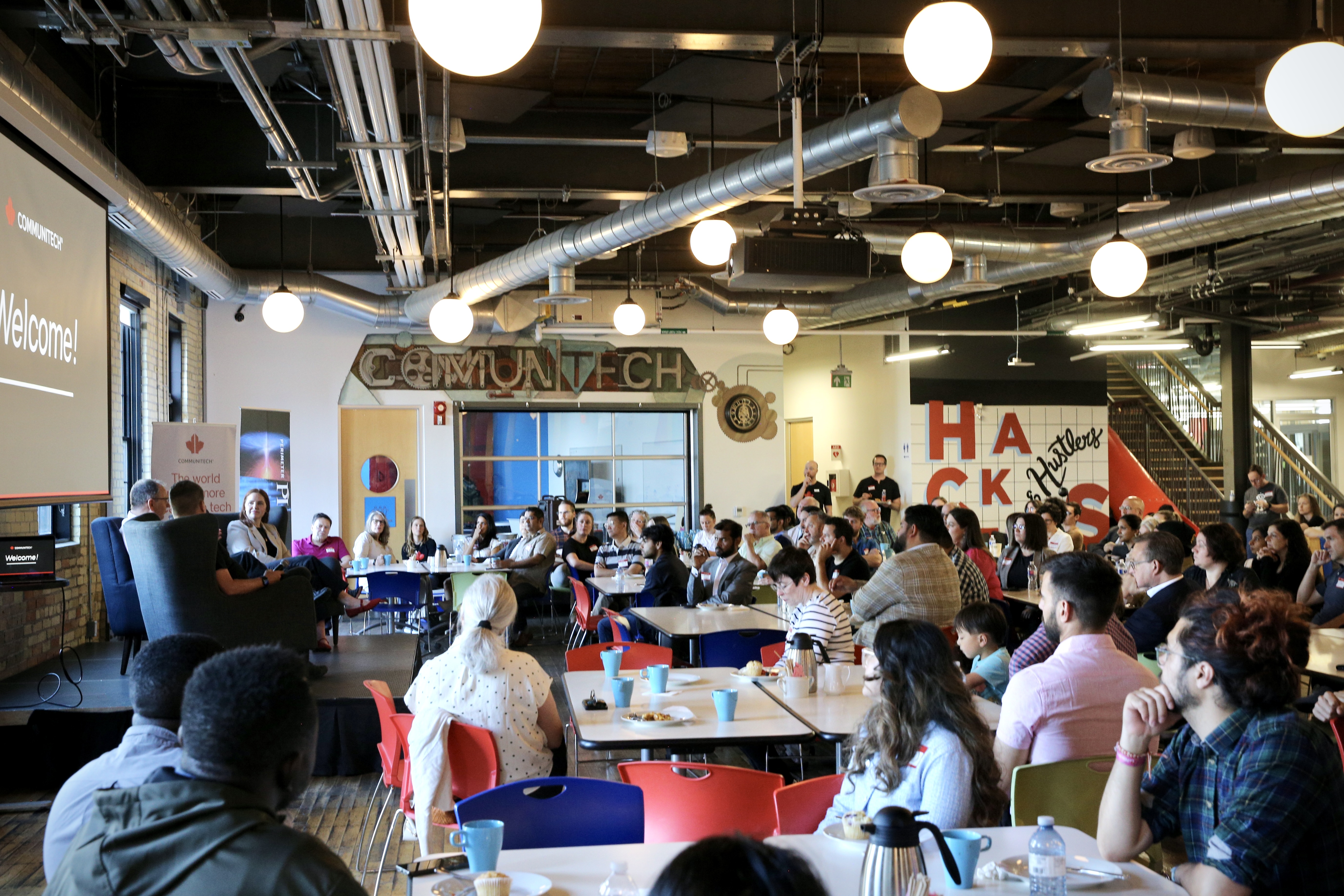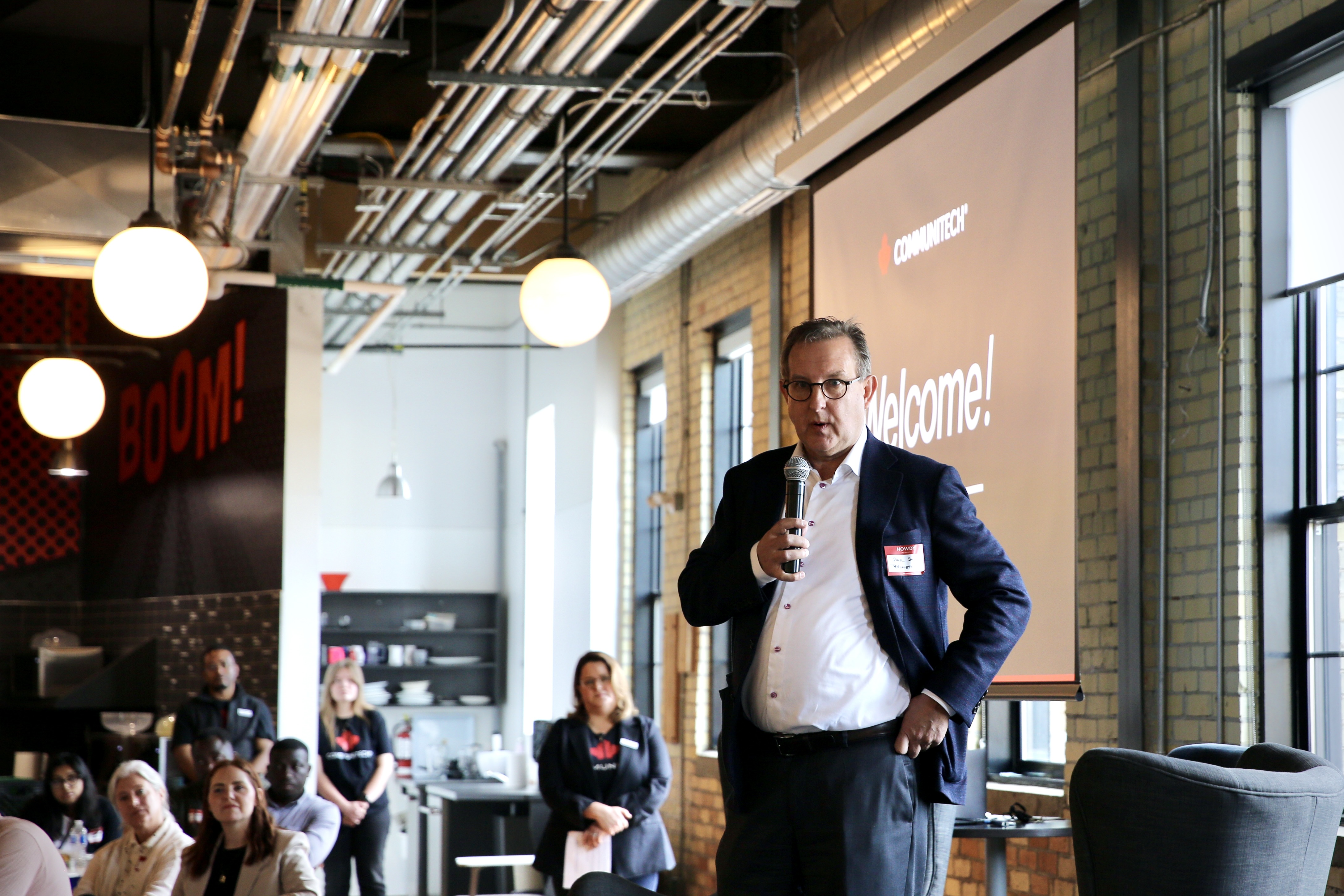A taste of the future was on the menu at the latest Communitech Breakfast with a deep dive into quantum computing. A quantum internet might not be as distant as we think, and its impact could revolutionize fields such as health care, climate change and artificial intelligence (AI).
“The biggest change in the 21st century is going to be the commercialization of quantum,” said Paul Terry, CEO of Photonic. “This happened in electricity and magnetism, which was thought to be magical. It’s going to happen again.”
Terry, along with Jessica Hodgson, Vice President of People at Photonic, joined Communitech President and CEO Chris Albinson for a discussion about the power of quantum technology and its impact.

Last November, Photonic and Microsoft joined forces to create technology that can send quantum information safely over long distances. Both companies are working together to create new capabilities and unlock the next stages in quantum networking.
Building a quantum-based network alongside the existing internet infrastructure has long been an ambitious goal, and Photonic says it’s now one step closer to making quantum internet a reality. The Vancouver-based company recently announced a new development that showcases a fundamental capability: entanglement distribution over long distances.
It’s one of three stages of quantum networking Microsoft said it would address in partnership with Photonic, and brings them closer to creating one of the first quantum computers capable of expansion, error resistance and network connectivity.
“We’re focusing on distributed entanglement, essentially enabling qubits to be connected anywhere in the world.”
The company believes this addresses a key scalability issue in quantum computing and opens doors to transformative applications in various fields like materials science and drug discovery.

“If you can make a computer that can search that space and find chemicals that will actually bind to targets then what you’ve just done is redefined biology,” said Terry. “You no longer have to play with it in a chemistry lab. You can simulate it on a computer.”
Building quantum technology requires specialized knowledge, experience and abilities, so there is a high demand for skilled individuals in this field. However, like most tech sectors, there is a skills shortage for quantum computing jobs. A report by the World Economic Forum (WEF) indicates that over half of quantum computer companies are hiring.
“The quantum industry is going to move faster and grow faster than the quantum workforce can keep up,” said Hodgson. “We’re moving incredibly fast but we need to build in time to develop and grow our talent and make sure we’re educating them on all the things they need to be smart on. We’re going to scale, we’re going to get big.”
Terry says Photonic has employees from 23 countries, with a diverse workforce spanning the globe. While the company has about a dozen team members in Waterloo, it also requires many team members in Vancouver, where the team is physically building its technology.
The need for talent in the field is also important to the Perimeter Institute for Theoretical Physics. The Waterloo-based research centre has several faculty and associate faculty focusing on quantum information.

“It is really, really important. I think it’s something this area can play a major role in,” said Paul Smith, COO and Managing Director of Perimeter Institute, who spoke at Communitech following the discussion.
The Perimeter Institute is looking to expand its master’s program in theoretical physics to provide students with opportunities to work in quantum. Terry believes quantum is the most untapped resource in the country and advocates for more awareness and education.
“I would love to give every 16 year old in every school in Canada access to quantum technology to educate them from a very early age,” said Terry.
Terry earned a degree with a double major in physics and electronics. He completed his PhD in only two years and became an associate professor when he was 22, with his research focused on AI, robots and supercomputing. Photonic was founded in 2016 by Stephanie Simmons, a co-chair of Canada’s National Quantum Strategy Advisory Board, and Michael Thewalt, a physics professor at Simon Fraser University. Terry joined as CEO in 2019.
Through global collaboration and co-innovation, Terry and his team believe tools can be created to solve some of the toughest problems in our industries and the world. He acknowledges that while the idea of transitioning from supercomputers to quantum computers holds exciting potential, some people are also concerned about what it might bring.
“I wouldn’t worry,” said Terry. “Technology is a great thing.”

